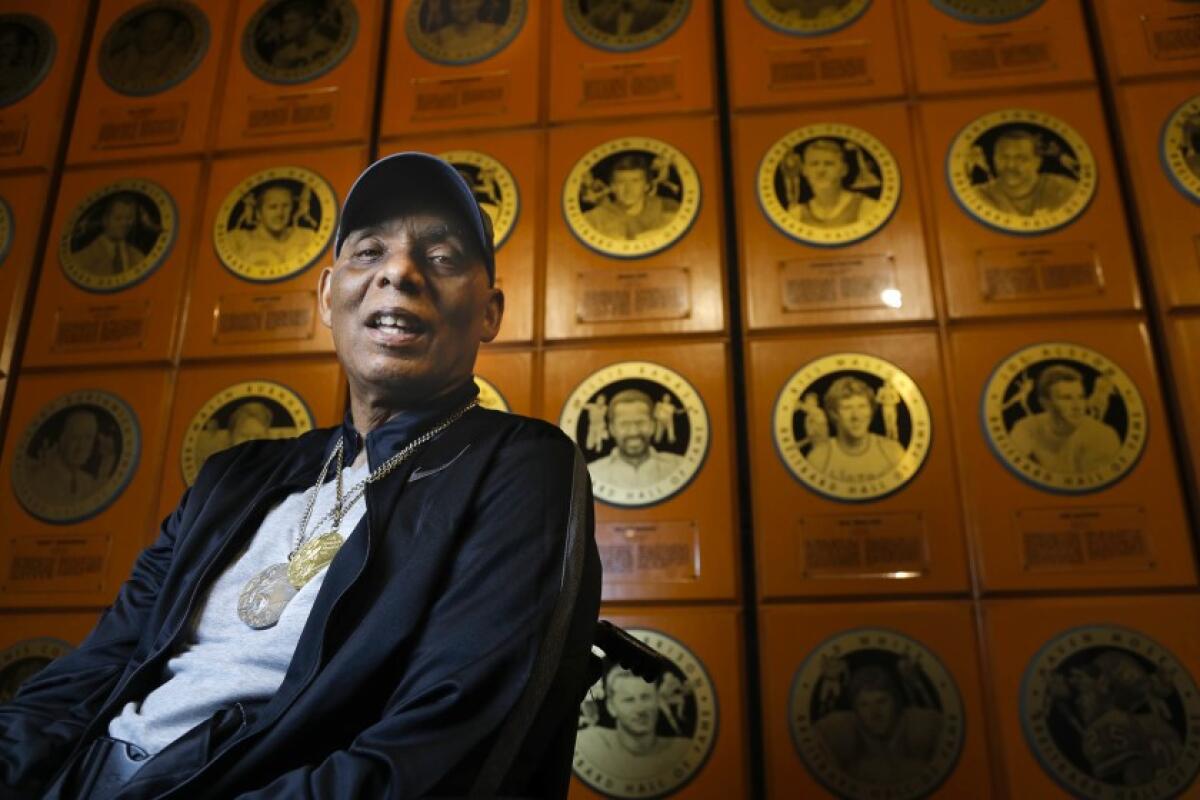Olympic long jump gold medal winner Arnie Robinson dies at 72

- Share via
The fact that Arnie Robinson learned to long jump using a discarded mattress in the driveway of his San Diego home offered the first hint of his fiery drive. Winning a gold medal at the 1976 Summer Olympics in Montreal revealed his talent, focus and unflinching commitment.
Beyond the world-class ability, the global track and field fame, the pile of titles at the USA Outdoor Championships, the NCAA championships with San Diego State, the Pan American Games and more, Robinson’s legacy reverberates because of a warming blend of humility and service in the shadows.
Robinson, who had fought an aggressive brain tumor since 2005, died early Tuesday, according to his son Paul. He was 72.
“His accomplishments, he didn’t wear them on his shoulder,” Paul Robinson said. “Leading through example, that’s who he was. He wasn’t about the noise.”
To understand the fiber of Robinson’s unassuming, sleeve-rolling being, dig into the things he didn’t talk about. Paul learned his father owned a gold medal when he was about 6 or 7. Coaches, administrators and friends marveled that he never discussed his enormous accomplishment, defying gravity and bicycling through space to go 27 feet, 4¾ inches, at Olympic Stadium.
No Wheaties box awaited, like decathlete Bruce Jenner. No lucrative athletic and TV careers loomed, like sweet-swinging boxer Sugar Ray Leonard. Robinson’s ’76 gold represented self-fulfillment, plain and brilliantly simple.
“Those days, they weren’t making much money,” said Bryan Kyle, a close family friend. “It was about heart and wanting to compete.”
What did Robinson do after he reached his sport’s mountaintop? He learned construction and, when money got tight, he built his own home from scratch. He wasn’t obsessed with the rear-view mirror. Perspective galore.
He won. He moved on. His eyes aimed forward, never back.
The family told a story about a mix-up of medication to control Robinson’s seizures a couple weeks ago. The dosage that slowed him for a decade and a half during his fight with glioblastoma was accidentally cut in half.
As he became more responsive, Robinson began to repetitively lift his leg.
“After all those years under seizure medication, he was trying to work out or exercise,” Paul said. “It’s like, it’s time to train, time to go, time to make something happen. Who does that?”
Robinson, for one. He survived a near-fatal collision with a drunk driver in 2000 — on the way home from a track meet, of course — that required the infusion of 40 pints of blood and more than a month in intensive care. Told he had perhaps six months to live after his cancer diagnosis in 2005, Robinson simply stiff-armed another life-threatening challenge.
There was too much work to do. When youth track in San Diego craved state-of-the-art timing equipment, Robinson spent more than $35,000 out of his own pocket.
Monique Henderson, a two-time gold medalist in the 4x400-meter relay, vividly recalled seeing Robinson at meet after meet as a kid. Even in relative anonymity, the two-time Olympic medalist — Robinson won bronze in 1972 — left an impression.
“I had no idea who the man was or what his accomplishments were,” Henderson told the Union-Tribune in 2018. “I just knew this man was making our meets as professional as he could. He didn’t have anybody assisting him. You go to a track meet now and there are five guys in a tent running the timing system. It was just Arnie.
“And Arnie didn’t charge any of the youth organizations a dime.”
Robinson was truly homegrown, attending Morse High School, then Mesa College, then San Diego State. He worked to make everyone along the way proud.
The financial challenges of rising through the amateur track ranks failed to faze Robinson or derail his emerging dream. While navigating the track circuit through Europe, Robinson learned of a teammate who lacked the money to secure a hotel room. Though Robinson had enough to grab a small room for himself, he decided to sleep in a park with his teammate.
Robinson’s riches came in the form of sweat equity and compassion.
“A very unique, beautiful mind,” Paul said.
Two years ago, Robinson was asked what he saw when looking at a photo of his winning jump, a moment of excellence frozen forever in time. Cancer and medication limited his ability to communicate, even then. Pride glimmered in his eyes.
Robinson flashed a rare moment of self-acknowledgment.
“The best in the world, that’s what I was,” he said.
Miller writes for the San Diego Union-Tribune.
More to Read
Start your day right
Sign up for Essential California for the L.A. Times biggest news, features and recommendations in your inbox six days a week.
You may occasionally receive promotional content from the Los Angeles Times.







